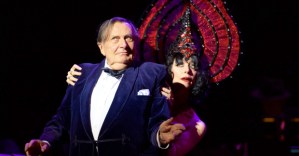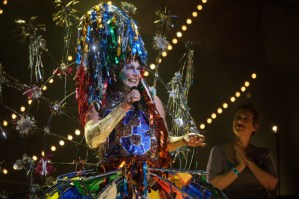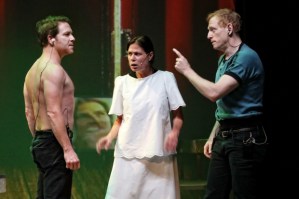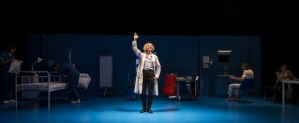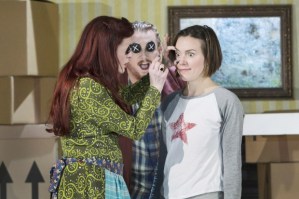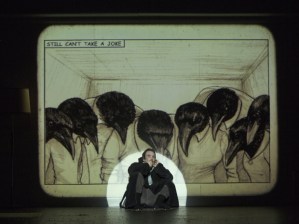Review: Barry Humphries' Weimar Cabaret (Barbican Theatre)
Legendary performer Barry Humphries brings some of the most iconic pieces from the Weimar repertoire to the Barbican
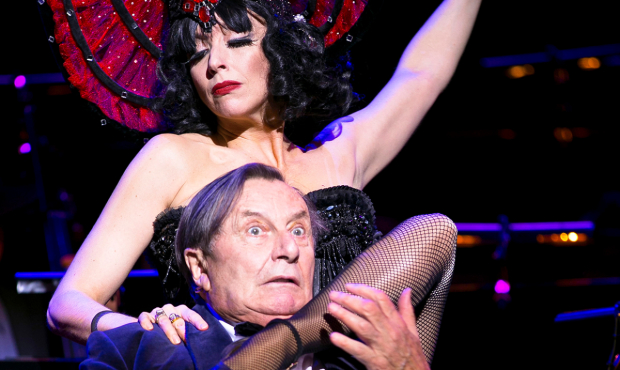
© Eoin Carey
House lights are up in the Barbican. The wings are swaddled in velvet. Members of the Aurora Orchestra, chatting, smiling, absently tuning their instruments, slowly wind their way into position centre-stage. Wearing a wide hat and long coat, Barry Humphries shuffles next to the pianist, incognito. It's an informal way to begin a show: relaxed, charming.
Humphries eventually puts himself at the front of the auditorium – introducing, in his billed role as "conférencier", the premise behind his show. Based on a stack of sheet music he found in a Melbourne bookstore in the 1940s, the two hours of performance aims to recapture the magic of a forgotten era of the Weimar years when names like Ernst Krenek, Erich Korngold and Kurt Weill were the toast of central Europe.
The historical period is a fascinating one – the cultural explosion of Weimar Germany is tinged by the fact that it is a direct precursor to the fascist wave of the 1930s – the last gasp of artistic freedom before the tyranny of Hitler.
What Humphries does well in Weimar Cabaret is unshackle the period from these perceptions, re-placing the composers and performers of the Weimar repertoire in a long genealogy of musical development that spans across the 20th century. The Weimar was pivotal for the transformation of European Jazz, the prominence of German, Austrian and Czech composers in Hollywood, even hinted towards the origins of rap music. Sexual, social and stylish liberations were the order of the day – typified by the likes of Schulhoff's Sonata Erotica, an extensive ode to female pleasure.
Every piece is performed by the superb Aurora Orchestra, led by incredible musical director and first violinist Satu Vänskä alongside famed cabaret artistic Meow Meow (recently seen at the Globe, both doing her own cabaret and in Emma Rice's A Midsummer Night's Dream) and occasionally Humphries himself.
The legendary performer is at first a bashful host ("I'm not used to pretending to be myself", he confesses, a small nod to his famous Dame Edna Everage character) but guides us wilfully through his favourite pieces, introducing each composer by name, giving piecemeal anecdotes about their lives, their histories. Dropping names like Christopher Isherwood, Billy Wilder and Marlene Dietrich casually into his spiel, Humphries has an easy manner (as well as some killer gags), building up a patchwork of references, weaving the Weimar period into his own life, especially in Melbourne, where there was one of the biggest communities of Jewish refugees after the 1930s.
By being so reverential, however, the show loses some of its razzmatazz, and at times lacks a sense of excitement or edge. Humphries' delivery can make the period feel more passé than pertinent – a vivid exploration of a bygone era rather than an attempt to draw it all into the present. Slightly clumsy references to the #MeToo movement don't land all that well either.
If Humphries at times feels as though he's stepped off the set of some BBC Four documentary (particularly during one slightly perambulatory story about stamps), then it is Meow Meow and the work done by the Aurora Orchestra that gloriously conjure the spirit of the Weimar era. Thankfully they are given plenty of time to do so, with a string of stellar numbers (Meow Meow occasionally vocally accompanied by Vänskä). As Meow Meow sings in a mixture of English and German (with translations provided in an incredibly comprehensive and expansive programme) the soft tungsten of the orchestra's music stand lights glow while the stark paleness of her spot illuminates her skin – spectral andwarm, thanks to some deft production design by William Reynolds and directorial vision by Nikki Woollaston.
Whenever Meow Meow steps up to perform, she's the one who manages to make the walls of the Barbican fall away, allowing past and present to sit smokily side by side. Her mournful rendition of Weill's "Surabaya Johnny" is a particular highlight, moving, tragic, echoing through the decades


